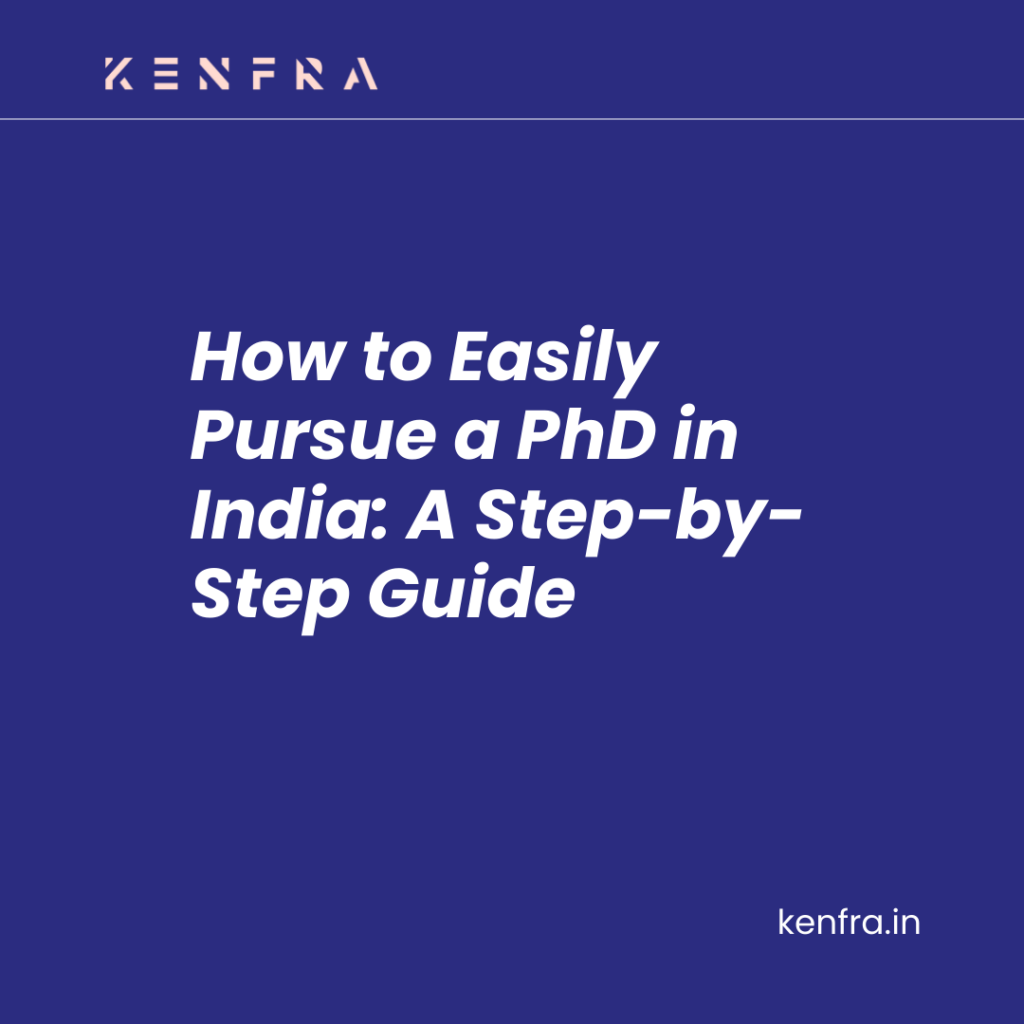How to Easily Pursue a PhD in India: A Step-by-Step Guide
Kenfra2025-09-26T16:51:50+05:30Easy Way to Get a PhD in India: Essential Documents, Process, and Timelines
Pursuing a PhD in India is a significant step toward advancing your academic and professional career. With a clear understanding of the required documents, admission process, and timelines, you can navigate the journey with confidence. This guide will walk you through the essential steps to apply for a PhD, the necessary documents, and how long the process typically takes. Whether you’re interested in part-time or full-time PhD courses, this blog will provide you with all the information you need.
First Steps to Applying for a PhD in India
Starting your PhD application process can seem overwhelming, but breaking it down into manageable steps can make it easier:
- Research Potential Programs: Begin by researching universities and institutions that offer PhD programs in your field of interest. Look into their specific requirements, faculty, research areas, and application deadlines.
- Prepare Required Documents: Gather and prepare the essential documents needed for the application. This includes your transfer certificate, degree certificate, proof of date of birth, and any other specific documents required by the university.
- Develop a Research Proposal: If the university requires it, prepare a detailed research proposal outlining your research question, objectives, methodology, and expected outcomes. This proposal is a critical part of your application and showcases your research readiness.
- Check Entrance Exam Requirements: Find out if the universities you are applying to require an entrance exam. Prepare for these exams by studying relevant material and understanding the exam format.
- Secure a No Objection Certificate: If you are currently employed, obtain a no objection certificate from your employer to confirm they support your decision to pursue a PhD.
- Submit Your Application: Complete the application process by submitting all required documents and meeting any specific university deadlines.
Essential Documents for PhD Admission in India
To apply for a PhD program, ensure you have the following documents ready:
- Transfer Certificate: Issued by your previous institution, confirming your eligibility to join a new academic program.
- Degree Certificate: Proof of your most recent academic qualification.
- Document Proof for Date of Birth: A birth certificate or passport to verify your date of birth.
- Research Proposal (if required): Detailed proposal outlining your research plan.
- No Objection Certificate (if employed): From your current employer, allowing you to pursue a PhD.
- Mark Sheet from Final Examination: Proof of your academic performance.
Major Principles for the PhD Admission Process
Understanding the core principles of the PhD admission process is crucial:
- Entrance Exams: Many universities require entrance exams to assess your research aptitude and subject knowledge. Be sure to check specific requirements and prepare accordingly.
- Research Proposal: A well-prepared research proposal is often a key component of your application. It demonstrates your research plan and readiness for the PhD program.
- Interview Process: Some institutions may conduct interviews to further assess your suitability for the program. Prepare to discuss your research proposal and academic background in detail.
How Long Does It Take to Complete a PhD in India?
The duration of a PhD program in India varies based on whether you are pursuing it full-time or part-time:
- Full-Time PhD: Typically takes 3 to 5 years to complete. This includes time for coursework, research, and writing your thesis.
- Part-Time PhD: Usually extends to 4 to 6 years. This option is designed for working professionals who need more flexibility.
The total duration can also depend on the specific requirements of the university and the nature of your research project.
Part-Time vs. Full-Time PhD Courses in India
Choosing between part-time and full-time PhD courses depends on your personal and professional situation:
- Part-Time PhD Courses: Suitable for working individuals who need flexibility. These programs allow you to work while conducting research, typically extending the duration of the program.
- Full-Time PhD Courses: Ideal for those who can dedicate their full attention to research. These programs are more intensive and usually completed in a shorter timeframe.
Conclusion
Embarking on a PhD journey in India involves several key steps, from preparing your documents to understanding the admission process and choosing the right course format. With the right preparation and knowledge, you can successfully navigate the application process and achieve your academic goals. For more information and personalized guidance on PhD admissions, visit our website or contact us.









Comment (1)
I really appreciate this useful manual. It rather precisely breaks out the Indian PhD process. Considering a PhD, this helped me to have a decent idea of what to expect.